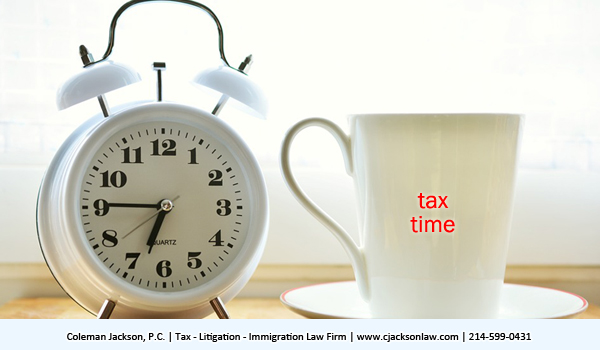By: Coleman Jackson, Attorney & Certified Public Accountant
March 30, 2020
As you can imagine, things are changing and developing fast and furious during this Covid-19 Pandemic. Developments in taxes are no exception! Our law firm desires to keep our clients and others informed with regards to certain tax developments that might impact their businesses. In keeping with that desire, note some of the most significant recent federal tax developments:
- Tax Day now July 15, 2020: The U.S. Treasury and Internal Revenue Service automatically extended from April 15, 2020 to July 15, 2020 the federal income tax filing due date. The IRS gives affected taxpayers until the last day of the Extension Period to file tax returns or make tax payments, including estimated tax payments, that have either an original or extended due date falling within the Period. The IRS will waive any interest and late filing and payment penalties related to these late tax returns.
- Small and midsize employers can begin taking advantage of two refundable payroll tax credits designed to immediately and fully reimburse them, dollar of dollar, for the cost of providing Coronavirus-related leave to their employees.
- The CARES Act of 2020 enacted in response to Covid-19 provides employers with an employee retention credit in the amount of 50% of their wages impacted by closure due to Covid-19. Further the Act which became law on March 27, 2020 extends the due date for paying employer payroll taxes. Taxpayers must carefully review the law and properly compute the amount of payroll taxes that can be deferred; because it is not 100% deferral of all payroll taxes. Note: The Small Business Administration has announced that they are taking applications for disaster relief from small businesses with respect to loans up to two million dollars for monies borrowed to make payroll and pay rent during this Covid-19 Crisis. The application process and details regarding what businesses qualify and the procedures for applying can be found on the Small Business Administration website. The SBA has announced that they have relaxed some of their processing and documentation requirements to expedite the processing of these emergency loans to small businesses impacted by Covid-19. It appears that these SBA emergency loans could be converted to grants under certain condition(s). The IRS will waive the usual fees and expedite requests for copies of previously filed tax returns for affected Covid-19 taxpayers who need them to apply for benefits or to file amended tax returns claiming casualty losses. Watch our blogs as more changes may be forth coming in the area of employer relief due to Covid-19 closures. But for now, this appears to be the game plan regarding employers.
- “Existing Installment Agreements –For taxpayers under an existing Installment Agreement, payments due between April 1 and July 15, 2020 are suspended. Taxpayers who are currently unable to comply with the terms of an Installment Payment Agreement, including a Direct Deposit Installment Agreement, may suspend payments during this period if they prefer. Furthermore, the IRS will not default any Installment Agreements during this period. By law, interest will continue to accrue on any unpaid balances.” Source: IR-2020-59, March 25, 2020.
- The CARES Act eliminates the 10% early withdrawal penalty for Covid-19 related distributions from retirement accounts and make other rule changes regarding retirement account contributions.
- The Act relaxes certain corporate and individual charitable contributions rules and provides for an above the line deduction up to $300 for charitable contributions.
- Texas has been declared a Presidential Disaster Area related to Covid-19, so more specific rules and provisions could be developed by the IRS related to individuals and businesses with business operations in Texas or impacted by this particular Presidential Disaster Area Declaration.
This law blog is written by the Taxation | Litigation | Immigration Law Firm of Coleman Jackson, P.C. for educational purposes; it does not create an attorney-client relationship between this law firm and its reader. You should consult with legal counsel in your geographical area with respect to any legal issues impacting you, your family or business.
Coleman Jackson, P.C. | Taxation, Litigation, Immigration Law Firm | English (214) 599-0431 | Spanish (214) 599-0432





